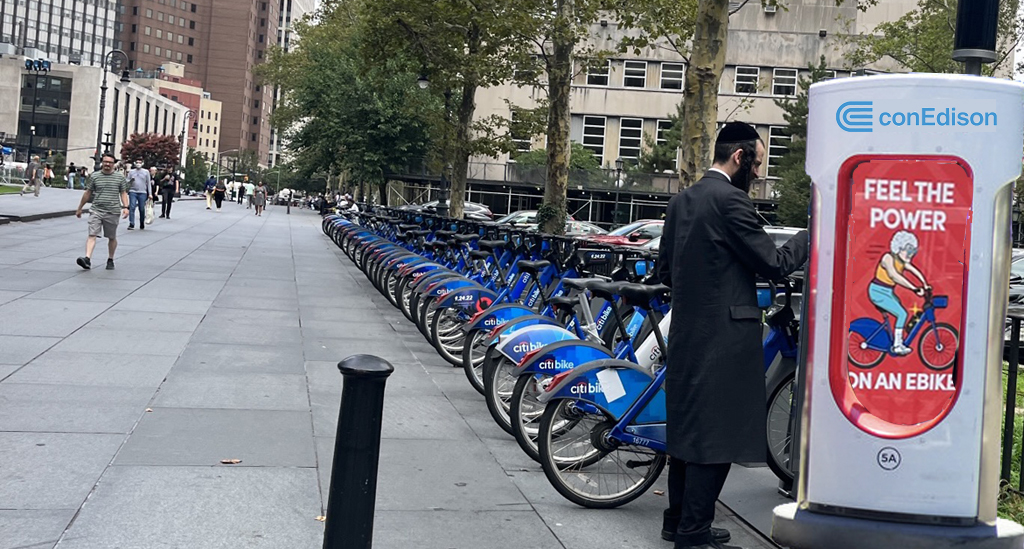A Manhattan City Council member is trying to juice the city's low-energy effort to bring the city's first electrified Citi Bike dock to his district.
City Council Member Erik Bottcher fired off a letter to Department of Transportation Commissioner Ydanis Rodriguez and ConEd President Tim Cawley demanding that the pair figure out whatever it is that's preventing Lyft from installing a Citi Bike station that's plugged in directly to the electric grid, a setup that would allow e-bikes to charge while sitting in docks rather than requiring workers to scurry around replacing spent batteries.
"I ... urge the Department of Transportation and Con Edison to expedite the electrification of [Citi Bike] stations for the purpose of charging the pedal-assist bikes," Bottcher wrote to the colossuses of conveyance and current last Friday.
A pilot for the electrified Citi Bike stations was included in the amended the bike share contract which the City and Lyft inked last year, and two charged-up docks were supposed to debut in the city late last year, according to a press release from City Hall. Bottcher's letter is the first instance of any elected official publicly revealing which district was slated for a dock, and the first official notice that the project is running months behind schedule.
Sure, NYC was able to install 100 curbside electric vehicle chargers no problem. But as soon as that electric vehicle is a bike and not a car it becomes impossible. https://t.co/b9lx9heeNd
— Jason Rabinowitz (@AirlineFlyer) February 29, 2024
There's been no update on when the docks might be plugged in, so Bottcher said he wants a "detailed update" and "clear timeline."
The other electrified Citi Bike dock is supposed to be installed in Greenpoint, and the neighborhood's City Council representative is also asking for everyone involved to speed the turbines of government and the electricity behemoth.
"The prospect of electrifying Citi Bike docks is an exciting opportunity to make recharging e-bikes more efficient, reliable, and cost effective," said Council Member Lincoln Restler. "We're encouraged [but] are pushing to move this forward as quickly as possible."
It's unclear who's at fault for not installing the station. Per Bottcher's letter, Lyft says it's ready to get the station on the street. A representative for Restler's office said that DOT's permitting issues were holding everything up, and that it would take five or six weeks to install the stations once such issues were worked out. (DOT declined to comment on that specific assertion.)
ConEd, for its part, says that the company is just a middle man in the whole thing.
"Con Edison doesn’t provide permits for street furniture in the public right of way," said company spokesperson Elisabeth Ferrari. "Our role in supporting grid-connected micromobility equipment is to assess the impact of the charging load on the grid, and then help design and install the grid infrastructure to provide power to the equipment."
The DOT said that the agency is working on it.
"DOT is actively working on launching this effort and will have more to share soon," said agency spokesperson Vin Barone, who declined to go beyond that statement.
Once a station is plugged directly into the power grid, the battery on a pedal-assist bike will recharge in a dock. At the moment, the batteries are manually swapped out, a labor-intensive practice that means juiceless pedal-assist bikes sit useless while also taking up dock space. Lyft debuted five electrified stations in Chicago in 2022, but the idea hasn't made it from the Windy City to the Capital of the World yet.
Citi Bike e-bikes are by far the more popular way for people to use the system when compared to the classic non-electric bikes. E-bikes make up only about 25 percent of the total fleet, yet provide close to half of the rides people take on Citi Bikes. With no way to charge batteries in place, Bottcher wrote that his constituents were at their wits' end as they're faced with dead bikes or bikes with very little battery power.
"We have been receiving numerous complaints from frustrated customers who are unable to access fully charged bikes, hampering their ability to utilize this vital and environmentally friendly mode of transportation," he wrote.
The lag in the debut of the electric stations isn't just a problem for current Citi Bike users either. Under the terms of the new contract, Lyft is going to double the number of e-bikes in the fleet from 10,000 to 20,000 bikes, which will add more capacity for e-bike rides, but also put additional strain on the company to keep up with replacing dead batteries.






